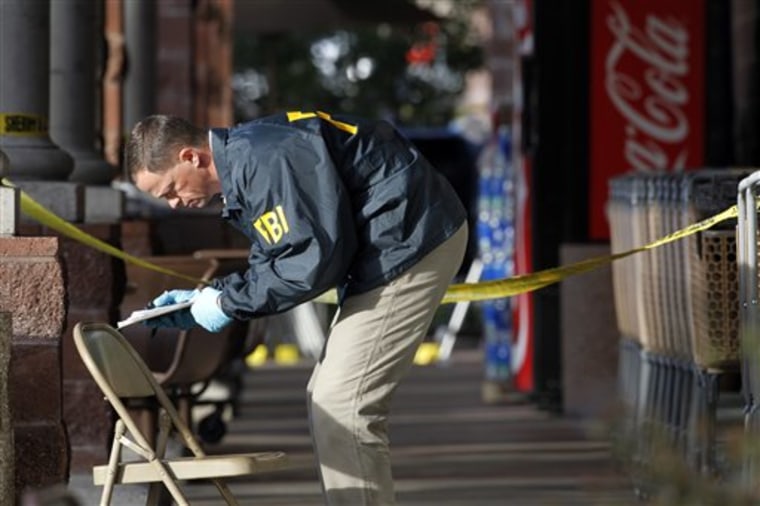One man posted a message to the White House Web site threatening to kill the president. "This is not a joke," he warned, and typed in his name.
Another vowed in letters to a federal judge and the Justice Department to "kill your president." He dutifully wrote his return address, a Texas state prison cell, on each envelope.
A third repeatedly sent threatening e-mails to the White House and said to Secret Service agents during an interview at an Alabama police station, "Barack Obama, I'm going to kill you."
These threats all led to federal prosecutions, but only after the accused virtually clapped investigators on the shoulder and said, "Arrest me!"
Just making a threat against a federal official — whether it's a worker at the local Social Security office or the president, even without any intent to follow through — is a federal crime.
But only a few dozen threats a year result in prosecutions, often because it's impossible to identify a suspect, Justice Department officials said.
A review of threat prosecutions by The Associated Press following the shootings of Democratic Rep. Gabrielle Giffords and U.S. District Judge John Roll last month in Tucson, Ariz., shows that it typically takes much more than posting warnings on obscure Internet sites — of the kind left by the defendant in that attack, Jared Loughner — to lead authorities to act.
The people actually charged with threatening federal officials have taken the time to write, call, e-mail or appear in person to put their names behind their warnings.
Each year, hundreds of threats make their way to the Justice Department, according to government data compiled by Transactional Records Access Clearinghouse, a private, nonpartisan group based at Syracuse University in New York. Justice officials said many cases reach them before a suspect has been identified because investigators need subpoenas or other legal help in trying to trace a threat to its source. Often a suspect is never identified, so no prosecution is possible.
"The Justice Department takes any and all threats against federal officials extremely seriously and works closely with a number of different law enforcement agencies to investigate such threats," Justice spokeswoman Jessica Smith said. "Whenever the facts and evidence developed in a particular investigation are sufficient to support a criminal prosecution for these violations in federal court, we bring a prosecution."
Last year, prosecutors brought 92 such criminal cases, according to department statistics. TRAC's figures cited 83, and there was no immediate explanation for the discrepancy. In addition, prosecutors declined to press ahead on 600 others, according to TRAC records.
Those convicted include Christopher Lynn Oliphant, a Texas prison inmate who mailed letters over 10 months threatening to kill President Barack Obama. A psychiatric evaluation judged Oliphant competent to stand trial. He pleaded guilty in December and awaits sentencing.
Also convicted last year was Thomas Stefanik of Huntington, Mass. Stefanik was sentenced to 21 months in prison for threatening judicial employees in Boston during a telephone call in which he said he would go to the courthouse with his shotgun "and show you who means business." He is appealing his conviction.
According to a criminal complaint:
Stefanik telephoned the federal appeals court in Boston in October 2009 about unpaid court fees. A case manager told him the federal trial court in Springfield, Mass., assessed the fees and suggested he call there.
Stefanik became agitated and asked the case manager to go to Springfield, 90 miles from Boston, and retrieve Stefanik's letter explaining he was indigent. When the case manager laughed, Stefanik uttered a racial slur and the employee hung up.
Eventually Stefanik spoke to a supervisor and threatened to show up in Boston with his shotgun. He was convicted by a jury.
Michael Levine, a defense lawyer in Portland, Ore., has represented clients accused of making threats. From the perspective of the authorities, Levine said, "You just don't know, although almost always the person making the threats is not the dangerous one."
In northern California, John Gimbel of Crescent City, had been on the Secret Service's radar for years of profanity-laced e-mails that called for the death of Obama, and before him, President George W. Bush — and their wives and children. But the service only moved to arrest him shortly before Obama visited the San Francisco area in October 2009.
At Gimbel's trial, jurors were shown vivid e-mails filled with racial invective and calls to violence. Gimbel argued he was merely exercising his free speech rights. A Secret Service agent wrote in court papers that Gimbel said "he didn't want to harm the president, but only wanted to draw attention."
The jury split over the verdict, leading to a mistrial and the government's decision to drop charges.
Levine said threat case defendants he knew displayed mental illness, extreme emotional distress, or a lack of judgment brought on by alcohol or drugs. "There's something behind it. People don't normally go around threatening people," he said.
Adam Albrett, a Fairfax county, Va., patent attorney, was arrested after he posted a message on the White House Web site that he planned to kill Obama unless he left office. Albrett left his contact information and also indicated he planned to leave water and food for his dog, Mara.
In August, federal prosecutors and a judge accepted Albrett's plea of not guilty by reason of insanity.
By December 22, Albrett was found have regained his sanity and determined not to be a risk. He was released by a federal judge, a decision prosecutors did not oppose.
In June, Brandon Coltress was indicted for making threats against Obama, both by e-mail and in a face-to-face interview with Secret Service agents at the Prattville, Ala., police department. In December, Coltress was found mentally incompetent to stand trial and ordered hospitalized.
